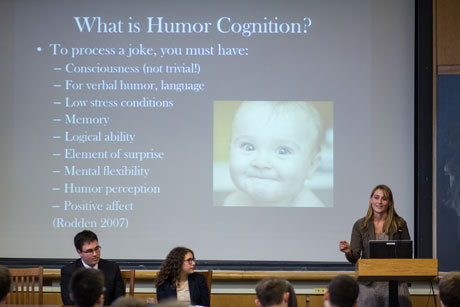College Scholars tackle research from art to engineering
By Daniel Aloi

Eleven seniors in Cornell’s College Scholar Program pursued projects ranging from decision-making among art collectors to designing, testing and launching a small satellite. They presented their work April 27 in Goldwin Smith Hall.
The program provides an intellectual niche in the College of Arts and Sciences for students focused on a particular topic, an interdisciplinary project or an aspect of a larger field. Students apply at the start of their sophomore year and present a senior thesis to complete the major.
Troy Hoffa worked on CUSat, an autonomous 100-pound satellite built by students and launched in August, designed to test the accuracy of the differential GPS system used in space and to capture and transmit images of the Earth, the moon and the comet ISON. The project was a challenging and rewarding experience, he said.
“Access to space is becoming easier and becoming cheaper” for private citizens, said Hoffa, who worked with a team on the satellite’s attitude determination, navigation and control subsystems.
Sarah Parauda explored the clinical use of humor in assessing cognitive functions in patients with brain injuries. She showed subjects a clip of a television comedy and measured for involuntary motor responses, particularly emotional facial expressions, using motion-sensing technology and software analyzing facial motions.
Tests were administered individually to 10 patients between November 2012 and February 2013 at Weill Cornell Medical Center, over four-day periods concurrent with other cognition tests (including a continuous EEG and a PET scan) in Dr. Nicholas Schiff’s Laboratory of Cognitive Neuromodulation. Students and other lab members acted as control subjects.
“Each trial, you get an enormous amount of data,” Parauda said. Her methodology to assess “the complex cognitive processes involved in understanding and appreciating a joke” could potentially help diagnose the level of cognition in minimally conscious patients, she said.
Ari Fine found that there was plenty of behavioral economics research on decision-making in financial markets but little to none on the art market. He interviewed several collectors, art advisers, museum directors and curators to study the role of emotions and social factors in collectors’ decisions, including an attachment to the objects they’ve acquired and the “psychic power of art.”
Collectors “may be unable to recognize a potential gain” and are “much more motivated to avoid losses,” he said. “So much of the value of art can’t be described in purely economic terms.”
Two scholars based their research on groups they knew firsthand. Nick Perez surveyed more than 300 students in Cornell’s Greek community to analyze shifts in moral identity over a two-month period of organized socialization. ROTC officer candidate Robert Callahan researched motivations for military enlistment to address the perceived divide between “elite” civilians and servicemen and -women at Cornell and nationally.
Other students presenting theses:
- Susie Forbath, on inspiration and innovation to be drawn from early personal computers geared to children – the 1972 Dynabook and 1997 Apple eMate – in the design of new computing devices.
- Anna Corrigan, on public memorials in Latin America showing the faces of disappeared persons. The displays are a political, social and aesthetic intervention, she said, opposing a “state-imposed memory” and “a systematic erasing of an entire generation.”
- Patrick Nowak, on the impact of racialized drug policy and drug law enforcement, including arrest and incarceration rates among African-Americans.
- Sadev Parikh, on “problematic language” – words like “terrorist” and “terror” – and linguistic bias. He proposed a “linguistic therapeutic framework” for strategic intelligence analysis.
- David Katz, on legal fictions, “facts that are not true but are nonetheless accepted by judges in their decision-making,” and how they help create, and obscure, legal change.
- Jeremy Brewer, on motivations in government accountability worldwide, relationships between the public and private sectors, and their stability and effectiveness.
Faculty moderators were Annetta Alexandridis, professor of the history of art and visual studies; James Cutting, professor of psychology; Scott MacDonald, professor of philosophy; and Marilyn Migiel, professor of Romance studies.
Media Contact
Get Cornell news delivered right to your inbox.
Subscribe